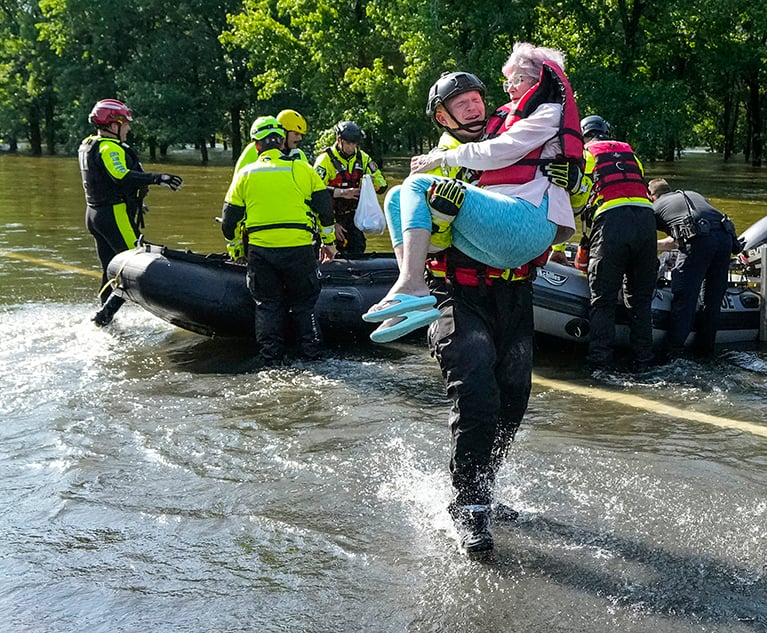JavaScriptA federal lawmaker who is one of the insuranceindustry's most vocal critics suggested at a Congressional hearinglast week that insurers with Hurricane Katrina claims had cheatedthe National Flood Insurance Program.
|"I am convinced that insurance adjusters billed the FloodInsurance Program for some damage that should have been covered byprivate wind insurance," Rep. Gene Taylor, D-Miss., testified at aHouse Financial Services Committee hearing.
|He said his office had received "thousands of calls" regardingprivate insurers, but not one complaining of the NFIP's actions inhandling claims.
|Rep. Taylor sharply criticized carriers for their handling ofclaims after Hurricane Katrina and promised to "lay out the case"for a Congressional investigation of insurers at an upcominghearing.
|That session, scheduled for Feb. 28, will be before theFinancial Services Subcommittee on Oversight and Investigations,which is chaired by Rep. Mel Watt, D-N.C.
|"For thousands of destroyed properties in Mississippi, insurersassigned all damages to flooding covered by the National FloodInsurance Program, and none to their own windstorm policies," Rep.Taylor said in testimony before the committee.
|Rep. Taylor--who sued his own insurer, State Farm, in a claimsdispute after his Gulf Coast home was destroyed by HurricaneKatrina--added that the Mississippi coast "suffered several hoursof very destructive hurricane winds before inundation by the stormsurge."
|Insurers have rejected thousands of claims where wind and stormsurge were both involved, arguing they are not compensable underpolicy flood exclusion language.
|A federal judge in Mississippi has ruled they must evaluate whatpercentage of home damage was due to wind, and the state attorneygeneral has sued to invalidate such policies.
|The NFIP, according to Rep. Taylor, paid an average of $142,000for more than 18,000 flood claims in three counties along thecoast, while insurers paid over 250,000 claims totaling more than$3.5 billion for the 79 counties in Mississippi that are not on theGulf.
|He also charged that insurers have a "conflict of interest" inthat the NFIP gives them the obligation to adjust a claim for windor water damage.
|"The contract between NFIP and an insurance company requires anadjuster to represent the flood program as well as the insurancecompany," he said.
|According to Rep. Taylor, "federal regulations require theadjuster to make a proper adjustment and apply the same standardsto the flood claim as to the wind claim. That certainly did nothappen in south Mississippi."
|To help resolve the problem, Rep. Taylor said he would introducelegislation that would expand the NFIP to allow it to writemultiperil policies, with premiums based on "actual risk," and withno subsidies.
|"If this bill is enacted, property owners will be able to buyinsurance and know that their damage will be covered," he said."They would not have to hire lawyers, engineers and adjusters totry and prove what damage was caused by wind and what was caused bywater."
|Rep. Charles Boustany, R-La., noted that Hurricane Rita had alsowreaked havoc on his area, and said the federal government shouldhelp insurers provide coverage to homeowners along the Gulf Coastby making it easier to obtain reinsurance and by allowing companiesto set aside catastrophe reserves on a tax-deferred basis.
|Rep. Charlie Melancon, D-La., also spoke critically of theproblems of finding coverage for homeowners, noting that "privateinsurers have largely given up on Louisiana and other places whereit appears they can't make an easy buck."
|INDUSTRY REACTION
|Insurance groups defended their actions post-Katrina, but alsosaid they will work with lawmakers after being sharply criticizedby Rep. Taylor.
|Dennis Kelly, a representative for the American InsuranceAssociation, declined to address Rep. Taylor's commentsspecifically, but said that "our industry is made up of hundreds ofthousands of skilled professionals who work hard and ethically forpolicyholders daily."
|Joseph Annotti, senior vice president for public affairs for theProperty Casualty Insurers Association of America, said thatinsurers and their agents "overcome obstacles to accessingconsumers and storm-ravaged properties to quickly and fairly settlemillions of claims."
|"The industry continues to be instrumental in helping to provideconsumers and businesses with the financial resources necessary torebuild their lives and communities," he added.
|Mr. Kelly also said AIA would oppose Rep. Taylor's proposedlegislation allowing NFIP to write multiperil policies.
|"We support reforms to the NFIP, expanding it to cover morehomes and businesses," Mr. Kelly said. "But we oppose expanding agovernment program to cover perils that the private market isalready covering."
|Both Mr. Kelly and Mr. Annotti said their groups were willing towork with policymakers in advance of the House Financial ServicesSubcommittee hearing on Feb. 28.
|This article originally appeared in The National UnderwriterP&C. For the complete article, please click here
|Interested in more catastrophe news and in-depth articles? Headover to Claims' catastrophe channel for more information.
Want to continue reading?
Become a Free PropertyCasualty360 Digital Reader
Your access to unlimited PropertyCasualty360 content isn’t changing.
Once you are an ALM digital member, you’ll receive:
- All PropertyCasualty360.com news coverage, best practices, and in-depth analysis.
- Educational webcasts, resources from industry leaders, and informative newsletters.
- Other award-winning websites including BenefitsPRO.com and ThinkAdvisor.com.
Already have an account? Sign In
© 2024 ALM Global, LLC, All Rights Reserved. Request academic re-use from www.copyright.com. All other uses, submit a request to [email protected]. For more information visit Asset & Logo Licensing.








